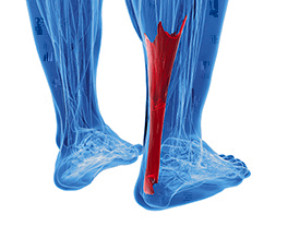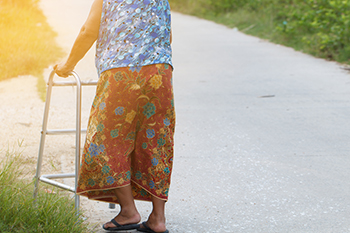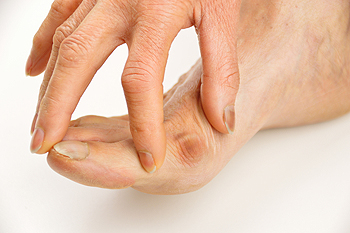
There is no mistaking an Achilles tendon injury when it occurs. This large tendon, located at the back of the calf, connects the calf muscles to the heel bone. It is responsible for pointing and flexing the feet, which is necessary in completing daily activities. An injury can happen from increasing running mileage and speed too quickly, which can cause severe pain and discomfort. Patients who have experienced this type of injury find it difficult to walk and are unable to bend their ankle. Mild relief may be found by taking anti-inflammatory medicine, and it may help to stretch the calves. Effective prevention techniques for an Achilles tendon injury includes strengthening the feet and calves as often as possible, which can help to ease the loading force on the tendon. This is accomplished by standing on a step, and lowering the heels one at a time, until a stretch is felt. An Achilles tendon injury often needs immediate attention, and it is strongly suggested that you confer with a podiatrist as quickly as possible who can guide you toward the correct treatment techniques.
Achilles tendon injuries need immediate attention to avoid future complications. If you have any concerns, contact one of our podiatrists of Illinois . Our doctors can provide the care you need to keep you pain-free and on your feet.
What Is the Achilles Tendon?
The Achilles tendon is a tendon that connects the lower leg muscles and calf to the heel of the foot. It is the strongest tendon in the human body and is essential for making movement possible. Because this tendon is such an integral part of the body, any injuries to it can create immense difficulties and should immediately be presented to a doctor.
What Are the Symptoms of an Achilles Tendon Injury?
There are various types of injuries that can affect the Achilles tendon. The two most common injuries are Achilles tendinitis and ruptures of the tendon.
Achilles Tendinitis Symptoms
- Inflammation
- Dull to severe pain
- Increased blood flow to the tendon
- Thickening of the tendon
Rupture Symptoms
- Extreme pain and swelling in the foot
- Total immobility
Treatment and Prevention
Achilles tendon injuries are diagnosed by a thorough physical evaluation, which can include an MRI. Treatment involves rest, physical therapy, and in some cases, surgery. However, various preventative measures can be taken to avoid these injuries, such as:
- Thorough stretching of the tendon before and after exercise
- Strengthening exercises like calf raises, squats, leg curls, leg extensions, leg raises, lunges, and leg presses
If you have any questions please feel free to contact our offices located in Wheeling and Berwyn, IL . We offer the newest diagnostic tools and technology to treat your foot and ankle needs.




